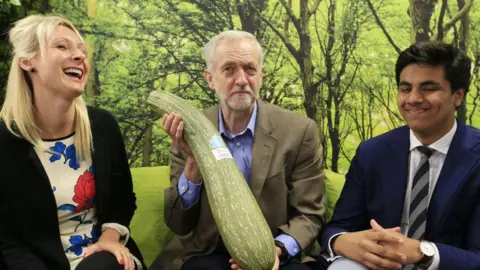In a recent op-ed published in the Telegraph, Jeremy Corbyn, the former Labour Party leader, has launched a scathing criticism of his ex-colleague Angela Rayner. He has accused her of irresponsibility for approving the sale of eight allotments since the last general election. Allotments, which are small, rented plots of land primarily used for growing personal fruit and vegetables, hold significant cultural importance in the UK. They are currently protected from development or sale under the Allotment Act of 1925, allowing such actions only with a minister’s approval.
Corbyn, a self-proclaimed enthusiast of allotment gardening, expressed his deep concern regarding the loss of these spaces. He described the pleasure he derives from “digging ground for potatoes,” emphasizing how crucial these spaces are for the community. He articulated that selling off allotments could threaten the future availability of these precious areas, making them “even more perilous.” Corbyn’s connection to his allotment in North London is well-known, where he finds satisfaction in growing various crops, notably marrows.
Rayner, who serves as the Deputy Leader of the Labour Party and has oversight of the Ministry for Housing Communities and Local Government (MHCLG), authorized these sales as councils grapple with pressures to meet housing demands. The previous month, information surfaced through parliamentary answers that revealed these allotments would be sold in regions including Derbyshire, Nottinghamshire, Oxfordshire, Somerset, Kent, Hertfordshire, and West Sussex, with developers planning to erect new housing on these community allotments.
Corbyn’s opposition has sparked a broader debate around the balance between developing social housing and preserving community green spaces. He acknowledges the urgent need for social housing but firmly believes that such projects shouldn’t come at the cost of sacrificing vital community spaces. In his missive, he suggested alternative approaches, such as constructing housing on underutilized industrial land, rather than encroaching on allotments. He passionately questioned whether the government would condemn future generations of gardeners to lose the joy of cultivating their own produce on cold, wet afternoons.
Corbyn’s letter resonated with many, as he connected the issue of allotments to historical struggles for access to land, invoking the actions of the Diggers during the English Civil War. He declared that the Enclosure Acts represented a significant abuse of power that resulted in the rural poor being displaced and facing starvation, leading many to migrate to burgeoning industrial cities like Birmingham and Manchester. He highlighted how allotments evolved as a response to the enclosures and the privatization of common lands.
Moreover, statistics from the National Allotment Association underscore the continuing relevance of allotments in modern society. Approximately one in eight people in the UK currently has no garden access, a figure that escalates to one in five in urban centers such as London. The demand for allotments remains high, with about 100,000 individuals languishing on waiting lists, some for decades, longing for their own piece of land where they can grow their food.
In response to Corbyn’s criticisms, a spokesperson from Rayner’s office emphasized that sales of allotments would only proceed under stringent criteria and were to occur only where they were “clearly necessary.” Acknowledging the importance of allotments for communities, they reiterated that the criteria for protecting these spaces are adequately robust.
The controversy surrounding the allotment sales mirrors broader concerns about green spaces in urban areas and how various government policies impact communities that rely on these resources. While the urgency for housing is pressing, the fervent discussions ignited by this issue reflect a deep-seated acknowledgment of the essential role that green spaces play in fostering community well-being and sustainability, a sentiment that Corbyn encapsulates in his call to action. As this debate unfolds, it is clear that finding the right balance between development and preservation will be crucial moving forward.











